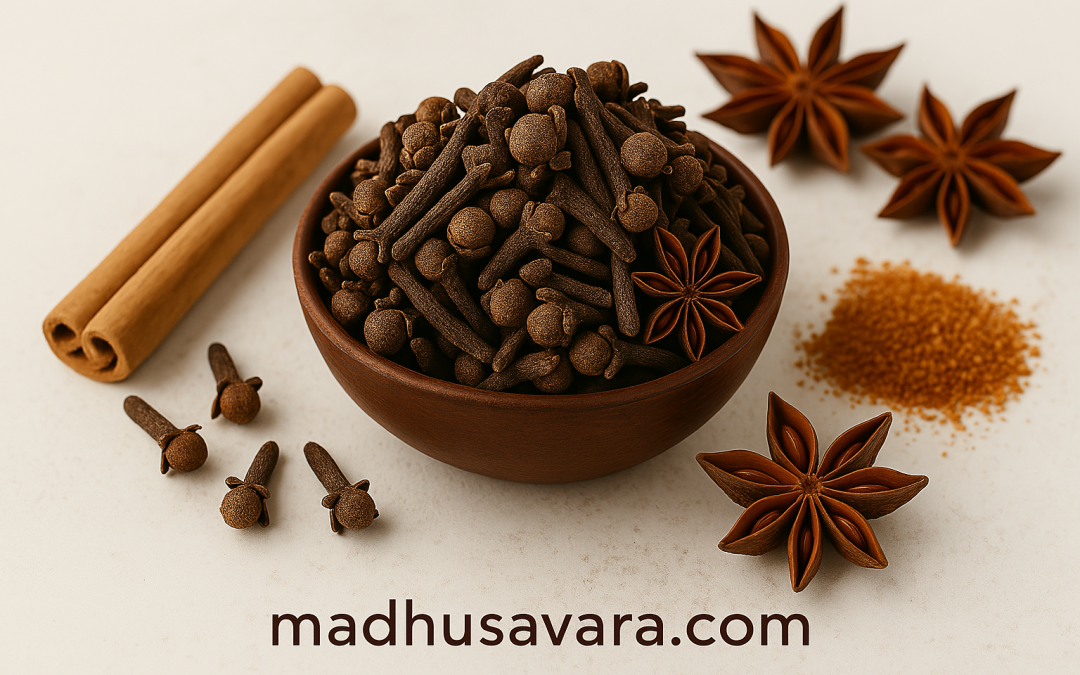🌿 Clove (Laung): The Mighty Spice of Aromatic Wellness and Healing Power
✨ Preface
Clove, known as Laung in Hindi, is not just a pungent kitchen spice – it is a wellness powerhouse deeply rooted in Ayurvedic, Unani, and global culinary traditions. Whether it’s the irresistible aroma of garam masala, the comforting taste of spiced chai, or a traditional remedy for a toothache, clove commands a presence like no other.
This article brings you a detailed, knowledge-rich exploration of clove, touching on its ancient origins, powerful health benefits, versatile uses, and necessary precautions, perfect for spice enthusiasts, health seekers, and modern cooks alike.
🕰️ Origin and Historical Significance of Clove
Cloves are dried flower buds of the Syzygium aromaticum tree, native to the Maluku Islands (Spice Islands) of Indonesia. Ancient trade records reveal that cloves were traded as far back as 200 BCE, reaching China, India, and the Arab world.
In India, clove became integral to Mughal cooking, Ayurvedic treatments, and spiritual rituals, often used in incense and garlands. Its warm, spicy aroma made it a royal spice, often reserved for emperors and temples.
Today, India is among the top consumers and importers of cloves, using it across culinary, medicinal, and cosmetic industries.
🌟 Significance in Ayurveda and Indian Tradition
In Ayurveda, clove is classified as “Ushna Virya” (hot in potency), and is known to:
-
Stimulate digestive fire (Agni)
-
Balance Kapha and Vata doshas
-
It acts as a natural antiseptic and analgesic
-
Improve circulation and respiratory health
It is a key component in many traditional formulations like Trikatu, Chyawanprash, and clove oil remedies for sore throats and toothaches.
💪 Health Benefits of Clove (Laung)
Clove’s power lies in its active compound eugenol, which gives it strong anti-inflammatory, antiseptic, analgesic, and antimicrobial properties.
✔️ Top Clove Health Benefits:
-
Toothache Relief: Clove oil numbs the pain and fights infection.
-
Boosts Digestion: Stimulates saliva and gastric juices, reducing indigestion and bloating.
-
Improves Immunity: Antioxidants in clove help the body fight infections and chronic diseases.
-
Relieves Respiratory Issues: Used in steam inhalation and teas to ease asthma, cold, and cough.
-
Controls Blood Sugar: Studies show clove may help regulate glucose levels.
-
Supports Liver Health: Eugenol has liver-protective effects.
-
Improves Oral Hygiene: Acts against bacteria causing bad breath and gum disease.
🧪 Scientific Note: A 2021 study in the Journal of Food Science highlighted clove’s high antioxidant score, making it one of the most potent spices for inflammation and microbial defense.
🍛 Culinary Uses of Clove in Indian Cooking
Clove is aromatically intense — slightly sweet, warming, and pungent. It is used whole or ground in Indian cooking, offering complexity to both savory and sweet dishes.
🍲 Culinary Applications:
-
Tadka (Tempering): Whole clove is sautéed in oil/ghee to infuse flavor in dals and curries.
-
Biryani and Pulao: Key spices in rice dishes, giving depth and fragrance.
-
Masala Chai: Essential in spiced tea blends.
-
Desserts: Used in kheer, halwa, and masala milk.
-
Pickles and Spice Mixes: Found in garam masala, chaat masala, and curry powders.
🧂 Cooking Tip:
Cloves should be used in moderation — a little goes a long way. Toasting or frying in ghee brings out their boldest flavor.
⚠️ Precautions When Using Clove
While clove offers amazing benefits, overuse or improper use may lead to side effects.
❗ Clove Safety Tips:
-
Avoid excess consumption: It can cause acidity or nausea.
-
Pregnant and breastfeeding women should consult doctors before consuming medicinally.
-
Children: Clove oil is potent and should never be used undiluted on children.
-
Clove Oil: Only use externally or under medical supervision internally — too much eugenol can be toxic.
-
Medication Interaction: Can interfere with blood-thinning medication.
🧂 Storage and Shelf Life
Store whole cloves in airtight containers, in a cool, dry place. Whole cloves can last up to 2 years without losing aroma. Ground clove should be used within 3-6 months for maximum flavor.
💡 Madhusavara’s Tips for Using Clove
-
Add 2-3 cloves to boiling water for an instant immunity-boosting tea.
-
Make homemade clove mouthwash by boiling with cinnamon and mint leaves.
-
For cold relief, steam with clove and eucalyptus oil — opens up nasal passages fast.
-
Add ground cloves to masala milk during winters for warmth and immunity.
✅ Conclusion
Clove (Laung) is a small spice with extraordinary strength. From healing toothaches to flavoring biryanis, its presence in your kitchen and medicine cabinet is non-negotiable. With centuries of proven use in Ayurveda, Indian cuisine, and global wellness practices, clove continues to be a revered ingredient that bridges taste and therapy.
Reviving your relationship with this ancient spice can enhance your cooking, boost your health naturally, and connect you with India’s rich culinary heritage.
⚠️ Disclaimer
This article is for informational purposes only. While clove offers many benefits, do not use it as a substitute for professional medical advice or treatment. Consult a healthcare provider before using clove for therapeutic purposes or in high dosages, especially in oil form or supplements


